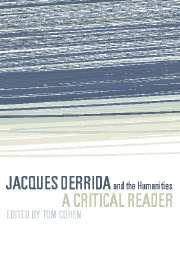Book contents
- Frontmatter
- Contents
- Preface
- Acknowledgements
- Biographical chronology
- Introduction: Derrida and the future of …
- Chapter 1 The future of the profession or the university without condition (thanks to the “Humanities,” what could take place tomorrow)
- Chapter 2 Derrida and literature
- Chapter 3 Derrida and gender: the other sexual difference
- Chapter 4 Derrida and aesthetics: Lemming (reframing the abyss)
- Chapter 5 Derrida and representation: mimesis, presentation, and representation
- Chapter 6 Derrida and philosophy: acts of engagement
- Chapter 7 Derrida and ethics: hospitable thought
- Chapter 8 Derrida and politics
- Chapter 9 Derrida and law: legitimate fictions
- Chapter 10 Derrida and technology: fidelity at the limits of deconstruction and the prosthesis of faith
- Chapter 11 Derrida and history: some questions Derrida pursues in his early writings
- Chapter 12 Derrida and psychoanalysis: desistantial psychoanalysis
- Glossary
- Index
Introduction: Derrida and the future of …
Published online by Cambridge University Press: 22 September 2009
- Frontmatter
- Contents
- Preface
- Acknowledgements
- Biographical chronology
- Introduction: Derrida and the future of …
- Chapter 1 The future of the profession or the university without condition (thanks to the “Humanities,” what could take place tomorrow)
- Chapter 2 Derrida and literature
- Chapter 3 Derrida and gender: the other sexual difference
- Chapter 4 Derrida and aesthetics: Lemming (reframing the abyss)
- Chapter 5 Derrida and representation: mimesis, presentation, and representation
- Chapter 6 Derrida and philosophy: acts of engagement
- Chapter 7 Derrida and ethics: hospitable thought
- Chapter 8 Derrida and politics
- Chapter 9 Derrida and law: legitimate fictions
- Chapter 10 Derrida and technology: fidelity at the limits of deconstruction and the prosthesis of faith
- Chapter 11 Derrida and history: some questions Derrida pursues in his early writings
- Chapter 12 Derrida and psychoanalysis: desistantial psychoanalysis
- Glossary
- Index
Summary
Thus we no longer know whether what was always represented as … “supplement,” “sign,” “writing,” or “trace,” “is” not … “older” than presence and the system of truth, older than “history.” Or again, whether it is “older” than sense and the senses: older than the primordial dator intuition, … older than seeing, hearing, and touching … not more “ancient” than what is “primordial.”
Speech and Phenomenathe technical structure of the archiving archive also determines … its relationship to the future. The archivization produces as much as it records the event.
Archive FeverOf course, if one defines language in such a way that it is reserved for what we call man, what is there to say? But if one re-inscribes language in a network of possibilities that do not merely encompass it but mark it irreducibly from the inside, everything changes. I am thinking of the mark in general, of the trace, of iterability, of différance. These possibilities or necessities, without which there would be no language, are themselves not only human … I am speaking here of very “concrete” and very “current” problems: the ethics and the politics of the living.
“Eating Well”WAGER
One could speak here of many things: the event horizon, the prosthetic earth, the absolute translation of legacies, the gambling of alternative futures, memory grids that give place to or transform institutions from within, the hyper-politics of the allomorphic archive, experimental chronographics – all part of the Derridean wager. Perhaps.
- Type
- Chapter
- Information
- Jacques Derrida and the HumanitiesA Critical Reader, pp. 1 - 23Publisher: Cambridge University PressPrint publication year: 2002
- 1
- Cited by

